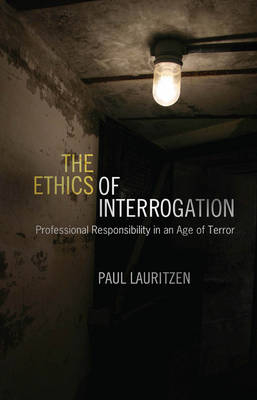
The Ethics of Interrogation
Georgetown University Press (Verlag)
978-1-58901-972-0 (ISBN)
Can harsh interrogation techniques and torture ever be morally justified for a nation at war or under the threat of imminent attack? In the aftermath of the September 11, 2001, terrorist strikes, the United States and other liberal democracies were forced to grapple once again with the issue of balancing national security concerns against the protection of individual civil and political rights. This question was particularly poignant when US forces took prisoners in Afghanistan and Iraq who arguably had information about additional attacks. In this volume, ethicist Paul Lauritzen takes on ethical debates about counterterrorism techniques that are increasingly central to US foreign policy and discusses the ramifications for the future of interrogation. Lauritzen examines how doctors, lawyers, psychologists, military officers, and other professionals addressed the issue of the appropriate limits in interrogating detainees. In the case of each of these professions, a vigorous debate ensued about whether the interrogation policy developed by the Bush administration violated codes of ethics governing professional practice.
These codes are critical, according to Lauritzen, because they provide resources for democracies and professionals seeking to balance concerns about safety with civil liberties, while also shaping the character of those within these professional guilds. This volume argues that some of the techniques used at Guantanamo Bay and elsewhere were morally impermissible; nevertheless, the healthy debates that raged among professionals provide hope that we may safeguard human rights and the rule of law more effectively in the future.
Paul Lauritzen is a professor of religious ethics and former director of the Program of Applied Ethics at John Carroll University in Cleveland. He is the author or editor of four books, including Medicine and the Ethics of Care (Georgetown, 2001) and has published extensively on issues in bioethics, human rights, and religious ethics. He is the past coeditor of the Journal of the Society of Christian Ethics and is currently an associate editor with the Journal of Religious Ethics.
Introduction Part I1. If You Can't Oppose Torture, What Can You Oppose? Psychologists Confront Coercive Interrogations 2. What's Wrong with Supporting National Security? Psychology and the Pursuit of National Security 3. Interrogating Justice: The Torture Memos and the Office of Legal Counsel 4. Ticking Bombs and Dirty Hands: Coercive Interrogation and the Rule of Law Part II5. Treating Terrorists: The Conflicting Pull of Role Responsibility 6. Discipline and Punish: The Importance of Professional Accountability 7. Professional Responsibility and the Virtuous Professional 8. The Day They Enter Active Service: The Military Conscience 9. Lessons Learned: Dignity and the Rule of Law10. This We Do Not Do: The Future of Interrogation and the Ethics of Professional Responsibility Bibliography Index
| Co-Autor | Paul Lauritzen |
|---|---|
| Verlagsort | Washington, DC |
| Sprache | englisch |
| Maße | 140 x 216 mm |
| Gewicht | 295 g |
| Themenwelt | Recht / Steuern ► EU / Internationales Recht |
| Recht / Steuern ► Öffentliches Recht ► Verfassungsrecht | |
| Recht / Steuern ► Privatrecht / Bürgerliches Recht ► Berufs-/Gebührenrecht | |
| Sozialwissenschaften ► Politik / Verwaltung ► Europäische / Internationale Politik | |
| ISBN-10 | 1-58901-972-5 / 1589019725 |
| ISBN-13 | 978-1-58901-972-0 / 9781589019720 |
| Zustand | Neuware |
| Haben Sie eine Frage zum Produkt? |
aus dem Bereich


